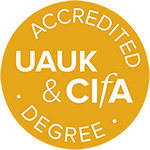Degree Structure
The Archaeology Tripos - the Cambridge name for courses and examinations that lead to a Bachelor of Arts degree - builds on over 100 years of teaching in Archaeology at the University of Cambridge. It gives you the broadest range of experiences and opportunities in the fields of Archaeology, Assyriology, Biological Anthropology, and Egyptology. These fields can be studied separately or combined and tailored to your own interests, through your paper choices, alongside compulsory papers (‘paper’ being the Cambridge term for a course of study leading to an examination).
You have between six and eight lectures and one or two supervisions each week. You may also have language classes, seminars and/or practicals. You’re assessed each year, through written exams and coursework. Some papers may include assessed practicals/fieldwork. Most students also write a 10,000 word dissertation in Year 3.
You pick three papers from six core archaeology, language and biological anthropology papers. They introduce you to:
Biological Anthropology: The study of the place that humans occupy in nature, and the origin and pattern of human diversity. With an emphasis on the interaction between biology and culture, it sits firmly between the social and biological sciences. The teaching in this subject area provides an understanding of our evolutionary history, adaptations, genetics, behaviour, and human health and disease, with a particular emphasis on how these factors relate to social and behavioural change.
Ancient Egypt and Mesopotamia: these regions housed the world's first literate complex cultures. The first-year survey course covers the history, material culture, sites, literatures and landscapes of these regions, to reach a deep and multi-disciplinary understanding of their cultures. First-year papers are also available in Egyptian and Babylonian language, which develop skills different from those in essay-based subjects.
-
World Archaeology
-
Archaeology in action
-
Introduction to the cultures of Egypt and Mesopotamia
-
Babylonian language 1
-
Egyptian language 1
-
Humans in biological perspective



